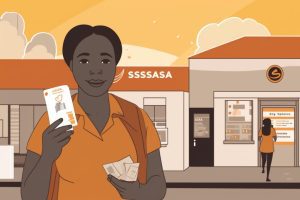The SASSA and Postbank Home Visit Program is a caring initiative in South Africa that brings help to people who can’t leave their homes due to illness. By visiting them directly, the program ensures that these vulnerable individuals receive their grants with dignity and respect. It’s designed to prevent misuse and only helps those who truly need it, with strict rules in place. This program not only provides financial support but also empowers beneficiaries, allowing them to choose someone they trust to assist with their grants. Through stories of people like Mrs. Nkosi and Mr. Dlamini, we see how this initiative changes lives, offering hope and restoring dignity for those in need.
The future of the April 2025 SASSA Older Person Grant is unclear, leaving over four million elderly South Africans anxious. Many are left waiting for information about their payments and any increases, with only a few weeks until the deadline. The card migration process has been slow and confusing, causing more worry among pensioners who depend on this support. As they brace for changes, the hope for clear communication and timely assistance remains strong, reminding us of the resilience of our elderly population during tough times.
In 2025, South Africa will change how SASSA pension payments are made, moving away from the old gold card system to newer, safer methods. Beneficiaries will need to visit their local SASSA office, bring the right documents, and ask to switch payment methods before the 15th of each month to ensure they receive their money on time. This transition aims to make payments easier and more secure, especially for those living far from service points. As the deadline approaches, communication and support will be vital to help everyone adjust smoothly to this new way of receiving their pensions.
In 2024, South Africa’s social support system is facing tough challenges. Long lines at SASSA offices show the struggle many people face to get help, made worse by limited money for grants and a gap in access to online services, especially for the elderly. While some regions like the Western Cape are trying new ideas to improve service, like using digital tools and engaging citizens, many still rely on traditional methods. This situation reflects a bigger story of the country working hard to support its most vulnerable people, aiming for a brighter future where everyone can thrive.
The SASSA Child Support Grant is a vital program in South Africa that gives R530 every month to caregivers of children under 18. This support helps families take care of their little ones, making sure they have what they need. New mothers are urged to apply right away to avoid delays, as it can take up to three months to process applications. With the right documents, like a birth certificate and ID, they can secure this important help. Overall, the grant is a promise that the country cares for its children, paving the way for a brighter future.
In October 2024, South Africa’s elderly will see a small boost in their SASSA oldage grants, increasing by R10 to R2,190 for those aged 6074 and R2,210 for those 75 and older. While every little bit helps, this increase doesn’t fully ease the burden of rising costs for essentials like food and healthcare. With around four million elderly recipients relying on these grants, it raises important questions about whether the support is enough. Despite the challenges, there’s hope for change as communities and advocates push for better assistance for those in need.
South Africa’s government provides financial support to eligible senior pensioners aged 60 and above through the South African Social Security Agency (SASSA). SASSA’s Older Person Grants offer a lifeline to citizens, permanent residents, and refugees who lack significant income. An asset test is enacted to determine eligibility, with successful applicants receiving retroactive payments from the date of their application. The South African government’s commitment to social justice is evident through its ongoing review and increase of the stipend, demonstrating its respect and care for the elderly population.
The South African Social Security Agency (SASSA) will increase the Social Relief of Distress (SRD) grant from R350 to R370 in April, benefiting around 19 million recipients and demonstrating the government’s commitment to improving living standards and tackling socioeconomic issues. The increase is part of broader plans to raise social grants across various demographics, including the elderly, war veterans, individuals with disabilities, and dependents in need of care. The government’s multipronged approach includes not only providing financial assistance but also linking grant beneficiaries to economic opportunities to reduce poverty in the long term and invest in the country’s future.
The incident underscores the significance of public participation in governance, reminding governments worldwide that the power ultimately lies in the hands of the people. An Abrupt Jolt to Beneficiaries: The Mass Suspension
Over 150,000 Children’s Grants have been suspended by the South African Social Security Agency (SASSA), leaving many families struggling to provide for their children’s education and other needs. Reports conflict over the cause of the suspension, with SASSA blaming incorrect banking details provided by grant applicants. The crisis has raised questions about the agency’s transparency and dedication to helping vulnerable citizens, highlighting the need for systemic accountability in South Africa’s social security system.
The SASSA Means Test is a tool in South Africa that ensures fair distribution of government grants to those in need by assessing an applicant’s income, assets, and financial status. Navigating the maze of this test requires staying within defined income and asset limits and understanding the regulations for each grant. The Means Test upholds the credibility of financial aid distribution to ensure that aid is granted to those who genuinely require it. It is a vital safety net for millions of people in South Africa and plays a significant role in ensuring the journey towards financial stability.
The recent malfunction in South Africa’s Social Security Agency (SASSA) payment system left a minimum of 600,000 social grant beneficiaries in agony, frantically waiting for their overdue deposits. The situation worsened when Johanna Gryzenhout, a 61yearold pensioner from Cape Town, experienced a heart attack due to the stress of waiting for her grant. This tragic event underlines the grim repercussions that system breakdowns can have on susceptible people.
South Africa’s Minister of Social Development, Ms. Lindiwe Zulu, accepted the International Social Security Association (ISSA) Good Practice Award for Social Security in Africa on May 17, 2023, on behalf of the department. The award recognizes the country’s commitment to providing social security protection for vulnerable children, specifically the Child Support Grant (CSG) initiative.
Postbank, a South African Post Office subsidiary, has launched a new system for SASSA Gold Card beneficiaries whose cards are expiring. The new system aims to simplify the payment process for social grant recipients, who can now receive payments at participating retailers using ID documents, SASSA Gold Card PINs, and cellphone numbers. This move is expected to reduce the queues for card replacements at Post Office branches. However, some concerns have been raised about possible challenges, particularly among older people or rural populations with limited access to technology and information.














